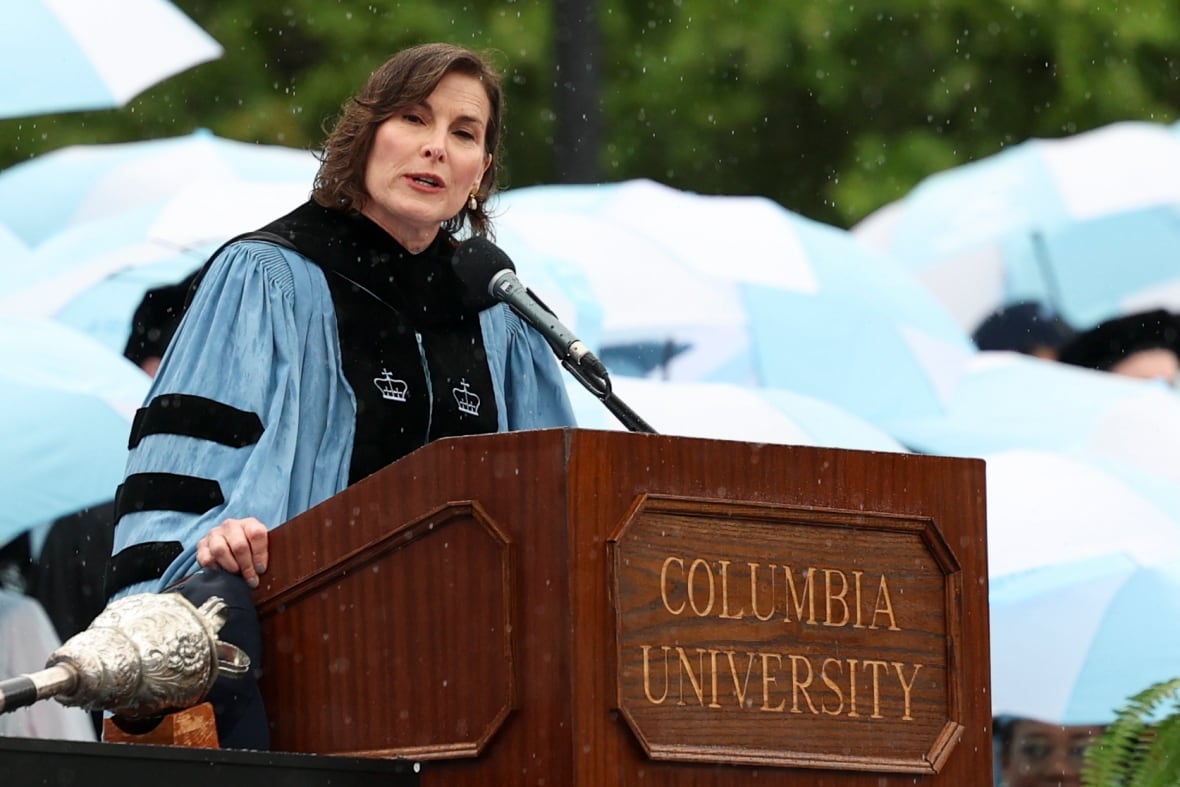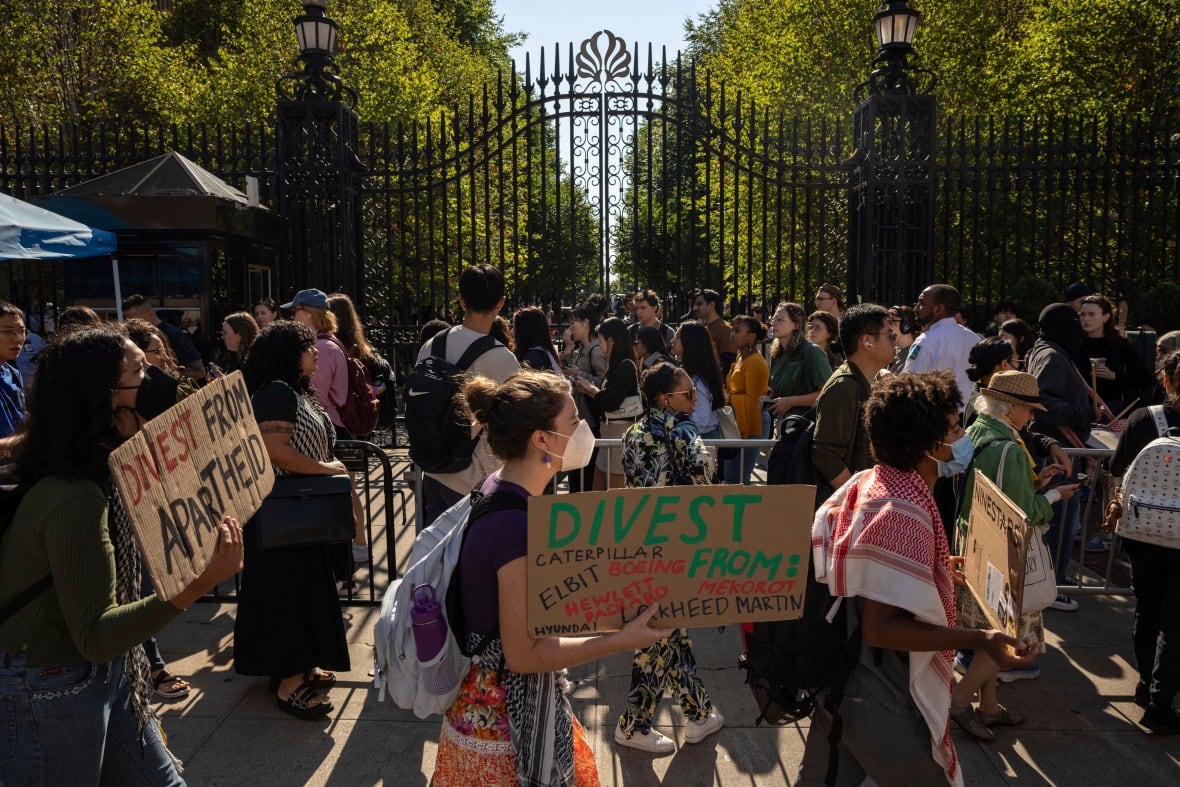Columbia University agrees to pay $220M in deal with Trump administration
University had previously agreed to several reforms around antisemitism, ending DEI programs

Columbia University has reached a deal with the Trump administration to pay more than $220 million to the federal government to restore federal research money that was cancelled in the name of combating antisemitism on campus, the university announced Wednesday.
Under the agreement, the Ivy League school will pay a $200 million US settlement over three years, the university said. It will also pay $21 million US to settle investigations brought by the U.S. Equal Employment Opportunity Commission.
"This agreement marks an important step forward after a period of sustained federal scrutiny and institutional uncertainty," acting university president Claire Shipman said.
The Trump administration pulled the funding because of what it described as the university's failure to squelch antisemitism on campus during the Israel-Hamas war that began in October 2023.
Columbia then agreed to a series of demands laid out by the Republican administration, including overhauling the university's student disciplinary process and adopting a new definition of antisemitism.

Agreement contains no admission of wrongdoing
Wednesday's agreement — which does not include an admission of wrongdoing — codifies those reforms while preserving the university's autonomy, Shipman said.
The school had been threatened with the potential loss of billions of dollars in government support, including more than $400 million US in grants cancelled earlier this year.

"The settlement was carefully crafted to protect the values that define us and allow our essential research partnership with the federal government to get back on track," Shipman said. "Importantly, it safeguards our independence, a critical condition for academic excellence and scholarly exploration, work that is vital to the public interest."
As part of the deal, Columbia agreed to a series of changes previously announced in March, including reviewing its Middle East curriculum to make sure it was "comprehensive and balanced" and appointing new faculty to its Institute for Israel and Jewish Studies. It also promised to end programs "that promote unlawful efforts to achieve race-based outcomes, quotas, diversity targets or similar efforts."

The university will also have to issue a report to a monitor assuring that its programs "do not promote unlawful DEI goals."
The pact comes after months of uncertainty and fraught negotiations at the more than 270-year-old university. It was among the first targets of U.S. President Donald Trump's crackdown on pro-Palestinian campus protests and on colleges that he asserts have allowed Jewish students be threatened and harassed.
Columbia's own antisemitism task force found last summer that Jewish students had faced verbal abuse, ostracism and classroom humiliation during the spring 2024 demonstrations.
Some Jewish students took part in the protests, however, and protest leaders maintain they aren't targeting Jews but rather criticizing the Israeli government and its war in Gaza.
Disciplinary action against student protesters
Columbia's leadership — a revolving door of three interim presidents in the last year — has declared that the campus climate needs to change.
Yesterday, the university announced disciplinary action against students who participated in a pro-Palestinian demonstration inside the school's main library before final exams in May and an encampment during alumni weekend last year.
A student activist group said nearly 80 students were told they have been suspended for one to three years or expelled. The sanctions issued by a university judicial board also include probation and degree revocations, Columbia said in a statement.
Wednesday's settlement also contains an agreement by Columbia to ask prospective international students "questions designed to elicit their reasons for wishing to study in the United States," and establishes processes to make sure all students are committed to "civil discourse."

Dozens who took part in library occupation punished
In a move that would potentially make it easier for the Trump administration to deport students who participate in protests, Columbia promised to provide the government with information, upon request, of disciplinary actions involving student-visa holders resulting in expulsions or suspensions.
Columbia on Tuesday announced it would suspend, expel or revoke degrees from more than 70 students who participated in a pro-Palestinian demonstration inside the main library in May and an encampment during alumni weekend last year.

Columbia was an early test case for the Trump administration as it sought closer oversight of universities that the Republican president views as bastions of liberalism.
Mahmoud Khalil, a former graduate student who had been a visible figure in the protests, became the first person detained in the Trump administration's push to deport pro-Palestinian activists who aren't U.S. citizens. Next came searches of some university residences amid a federal Justice Department investigation into whether Columbia concealed "illegal aliens" on campus
The Trump administration has used federal research funding as its primary lever in its campaign to reshape higher education. More than $2 billion in total has also been frozen at Cornell, Northwestern, Brown and Princeton universities. Administration officials pulled $175 million from the University of Pennsylvania in March over a dispute around women's sports. They restored it when school officials agreed to update records set by transgender swimmer Lia Thomas and change their policies.
The administration also is looking beyond private universities. University of Virginia President James Ryan agreed to resign in June under pressure from a U.S. Justice Department investigation into diversity, equity and inclusion practices. A similar investigation was opened this month at George Mason University.
Harvard University, meanwhile, became the first higher education institution to defy Trump's demands and fight back in court.
